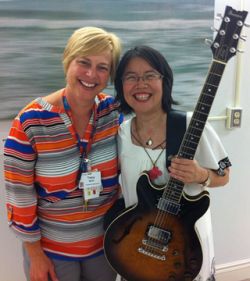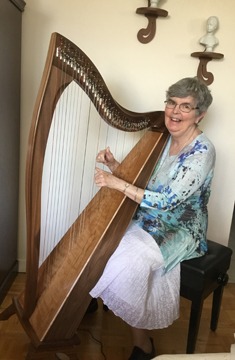The healing power of music

By Adena Goldberg

Music has the power to transform. A familiar song or tune can transport us back in time, and leave us with feelings of nostalgia, happiness and well-being. Music helps to build connections between people, during times of intense happiness, and also during times of deep sadness. For patients and their families, the journey through palliative care can be a tough, demanding and emotional experience. At Providence, we want our patients and their families to feel at ease and cared for, in a supportive and calming environment. That’s why on Monday evenings, beautiful melodies fill the halls of our Palliative Care Program, as expertly trained musicians play bedside music for patients and their loved ones.
This January marked the two year anniversary of a Providence Healthcare Foundation funded initiative that connects musicians from Music Can Heal with patients at Providence. Music Can Heal is a non-profit organization that brings peaceful, healing music to patients in need, be it to their bedside, within a hospital, a hospice or to their private residence. Hearing live music, either by a musician playing bedside or walking the halls of a busy hospital wing, can soothe, comfort, uplift and distract from pain.
For Talia Wooldridge, executive director and co-founder of Music Can Heal, the program has provided her organization and its musicians with a deeper appreciation for the therapeutic benefits of music.
“It has been a pleasure working with Providence on a monthly basis to help to bring music to those in need. I do know that all of the Music Can Heal musicians who play at Providence weekly are touched by the clients and friendly staff. They are a strong part of the Music Can Heal family,” said Wooldridge.

For Sister Gail Fox (right), a harpist and Chaplain, the healing power of music is central to the spiritual and emotional well-being of palliative care patients. Since 2014, she’s come to Providence twice a week to play her harp for patients who are facing the end of their lives. As Sister Fox moves from room to room, she is often touched by the compassionate care of relatives who are hopeful that harp music will bring much needed relief during difficult times.
Therapeutic music has been studied extensively, and research suggests that music has been proven to stimulate more parts of the brain at once than any other activity. “The music takes people to a different place and for a brief moment, the music can take away their pain,” said Sister Fox.
Sister Fox often plays therapeutic harp music at the bedside standing with family and loved ones. Sometimes there is laughter, and at other times there are tears, but more often than not, there’s silence.
“Mozart said, ‘the music is not in the notes, but in the silence in between’ and I see that all the time when I play for patients.
”
